What happens when we can no longer trust our memories? Who are we when we’ve lost our sense of identity? Not surprisingly, science fiction can turn these questions into gripping narratives, taking the stuff of neuroscience and psychology and turning it into thrilling, sometimes unsettling stories of the mind tipping into something uncanny, mysterious, or fully unknown.
Adding a speculative aspect to a narrative about memory can also turn a familiar story on its head. A tale of identity theft, a narrative about a community wondering who they are, or the story of a law enforcement officer dealing with a spate of unsolved crimes are all examples of ways in which familiar plots can be deepened and made profoundly unsettling when a detour is made away from strict realism. The following five books use a host of devices to explore bold questions about the nature and function of memory, venturing into uncharted territory along the way.
Adam Sternbergh, The Blinds
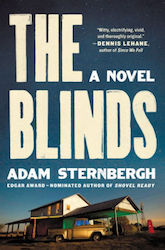 The high-concept premise of The Blinds throws speculation about memory and technology into a hard-boiled narrative with plenty of crime fiction in its DNA, along with more than a little corporate intrigue. It’s set in an isolated community composed mostly of criminals and witnesses to the unthinkable; they’ve had parts of their memories removed, including the knowledge of their relative guilt or innocence. When a few of the town’s residents turn up dead, it sets in motion a chain of events that rattles the community to its core, forcing several of its residents to question who they really are.
The high-concept premise of The Blinds throws speculation about memory and technology into a hard-boiled narrative with plenty of crime fiction in its DNA, along with more than a little corporate intrigue. It’s set in an isolated community composed mostly of criminals and witnesses to the unthinkable; they’ve had parts of their memories removed, including the knowledge of their relative guilt or innocence. When a few of the town’s residents turn up dead, it sets in motion a chain of events that rattles the community to its core, forcing several of its residents to question who they really are.
Tomoyuki Hoshino, ME
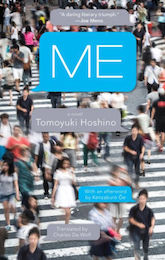 Tomoyuki Hoshino’s head-spinning novel ME begins innocuously enough: with the theft of a phone and a low-level scam being carried out by the book’s narrator, as he impersonates the phone’s owner in order to illicitly obtain some extra cash. Things take a turn for the weird when he begins to occupy aspects of the life of the man whose phone he stole; things get even weirder when he learns that he’s far from the only person for whom this is the case. While this novel contains a fair amount of musing on the interchangeability of a rootless generation, it also leaves plenty of space for disquieting acts and the threat of violence.
Tomoyuki Hoshino’s head-spinning novel ME begins innocuously enough: with the theft of a phone and a low-level scam being carried out by the book’s narrator, as he impersonates the phone’s owner in order to illicitly obtain some extra cash. Things take a turn for the weird when he begins to occupy aspects of the life of the man whose phone he stole; things get even weirder when he learns that he’s far from the only person for whom this is the case. While this novel contains a fair amount of musing on the interchangeability of a rootless generation, it also leaves plenty of space for disquieting acts and the threat of violence.
Sarah Hall, Madame Zero
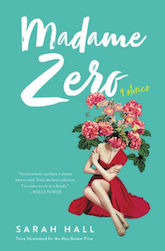 As is also the case with her novels, the short stories in this collection from Sarah Hall are a stylistically varied bunch, encompassing everything from tactile realism to surreal narratives in which reality itself threatens to collapse. In “Mrs. Fox,” a man’s wife abruptly becomes a fox–but it’s never quite clear if something magical has taken place, or if the narrator’s own perception of the world has gone awry. And in “Case Study 2,” the study of a child removed from a commune reveals that there are strange things afoot with the way the central character perceives the world–and heads into an uncanny musing on the nature of consciousness.
As is also the case with her novels, the short stories in this collection from Sarah Hall are a stylistically varied bunch, encompassing everything from tactile realism to surreal narratives in which reality itself threatens to collapse. In “Mrs. Fox,” a man’s wife abruptly becomes a fox–but it’s never quite clear if something magical has taken place, or if the narrator’s own perception of the world has gone awry. And in “Case Study 2,” the study of a child removed from a commune reveals that there are strange things afoot with the way the central character perceives the world–and heads into an uncanny musing on the nature of consciousness.
Zachary Mason, Void Star
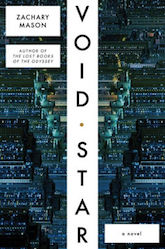 Zachary Mason’s novel Void Star is structured in a seemingly archetypal way: there are three parallel plotlines, in which characters maneuver through a near-future world in which class distinctions have become more bold, the wealthiest people have their aging put on hold, and the nature of memories has taken a sharp turn from what readers might expect. Saying too much about the plot of Void Star would spoil some of the bold turns this novel takes; suffice it to say, the ways in which memory and technology might collide play a significant part in the plot’s evolution.
Zachary Mason’s novel Void Star is structured in a seemingly archetypal way: there are three parallel plotlines, in which characters maneuver through a near-future world in which class distinctions have become more bold, the wealthiest people have their aging put on hold, and the nature of memories has taken a sharp turn from what readers might expect. Saying too much about the plot of Void Star would spoil some of the bold turns this novel takes; suffice it to say, the ways in which memory and technology might collide play a significant part in the plot’s evolution.
Michael Tolkin, NK3
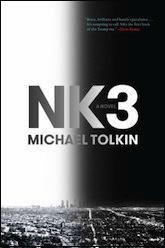 Many of Michael Tolkin’s works–including the novel The Player and the screenplay The Rapture–probe the inner workings of residents of Southern California under duress. Such is also the case in NK3, only in this case, a biological weapon has eradicated the memories of everyone living there. The resulting narrative is sometimes comedic and sometimes utterly horrific, depicting the ways in which some strive to rebuild civilization even as others descend into hellish conditions. It’s simultaneously pre- and post-apocalyptic in its scope, and it asks a host of crucial questions about whether or not our memories make us who we truly are.
Many of Michael Tolkin’s works–including the novel The Player and the screenplay The Rapture–probe the inner workings of residents of Southern California under duress. Such is also the case in NK3, only in this case, a biological weapon has eradicated the memories of everyone living there. The resulting narrative is sometimes comedic and sometimes utterly horrific, depicting the ways in which some strive to rebuild civilization even as others descend into hellish conditions. It’s simultaneously pre- and post-apocalyptic in its scope, and it asks a host of crucial questions about whether or not our memories make us who we truly are.
 Tobias Carroll is the managing editor of Vol.1 Brooklyn. He is the author of the short story collection Transitory (Civil Coping Mechanisms) and the novel Reel (Rare Bird Books).
Tobias Carroll is the managing editor of Vol.1 Brooklyn. He is the author of the short story collection Transitory (Civil Coping Mechanisms) and the novel Reel (Rare Bird Books).










